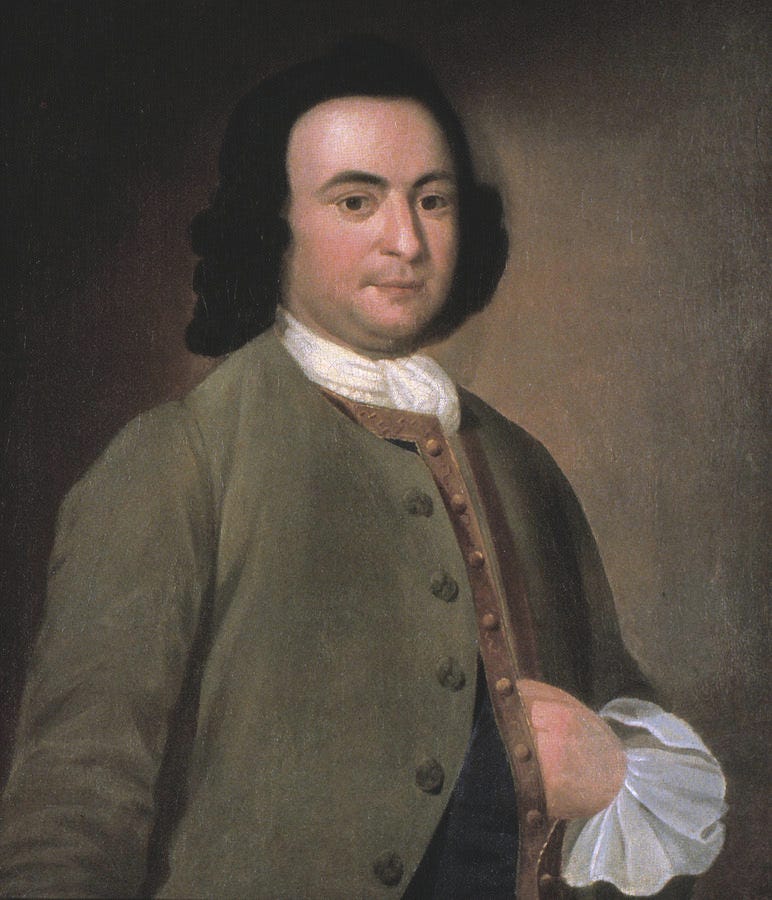Preparations for the Convention (1787)
George Mason, delegate from Virginia, called the "Father of the Bill of Rights".
Philadelphia, May 20th, 1787.
Upon our arrival here on Thursday evening, seventeenth May, I found only the States of Virginia and Pennsylvania fully represented. And there are at this time only five: New York, the two Carolinas, and the two before mentioned. All the states, Rhode Island excepted, have made their appointments but the members drop in slowly. Some of the deputies from the eastern states are here but none of them have yet a sufficient representation and it will probably be several days before the Convention will be authorized to proceed to business. The expectations and hopes of all the Union center in this Convention. God grant that we may be able to concert effectual means of preserving our country from the evils which threaten us.
The Virginia deputies (who are all here) meet and confer together two or three hours every day in order to form a proper correspondence of sentiments. And for form's sake, to see what new deputies are arrived, and to grow into some acquaintance with each other we regularly meet every day at three o'clock. These and some occasional conversations with the deputies of different states and with some of the general officers of the late army (who are here upon a general meeting of the Cincinnati), are the only opportunities I have hitherto had of forming any opinion upon the great subject of our mission and consequently a very imperfect and indecisive one. Yet upon the great principles of it I have reason to hope there will be greater unanimity and less opposition, except from the little states, than was at first apprehended.
The most prevalent idea in the principal states seems to be a total alteration of the present federal system and substituting a great national council or parliament consisting of two branches of the legislature, founded upon the principles of equal proportionate representation with full legislative powers upon all the subjects of the Union. And an executive. And to make the several State legislatures subordinate to the national by giving the latter the power of a negative upon all such laws as they shall judge contrary to the interest of the federal Union. It is easy to foresee that there will be much difficulty in organizing a government upon this great scale and at the same time reserving to the state legislatures a sufficient portion of power for promoting and securing the prosperity and happiness of their respective citizens. Yet with a proper degree of coolness, liberality and candor (very rare commodities by the bye), I doubt not but it may be effected. There are among a variety some very eccentric opinions upon this great subject and what is a very extraordinary phenomenon, we are likely to find the republicans on this occasion issue from the southern and middle states and the anti-republicans from the eastern. However extraordinary this may at first seem, it may I think be accounted for from a very common and natural impulse of the human mind. Men disappointed in expectations too hastily and sanguinely formed, tired and disgusted with the unexpected evils they have experienced, and anxious to remove them as far as possible are very apt to run into the opposite extreme. And the people of the eastern states, setting out with more republican principles, have consequently been more disappointed than we have been.
We found traveling very expensive — from eight to nine dollars per day. In this city the living is cheap. We are at the old Indian Queen in Fourth Street where we are very well accommodated, have a good room to ourselves, and are charged only twenty-five Pennsylvania currency per day including our servants and horses, exclusive of club in liquors and extra charges. So that I hope I shall be able to defray my expenses with my public allowance and more than that I do not wish.
Source: Kate Mason Rowland, The Life of George Mason (1892), II, 100-102. https://archive.org/details/toldcontemporari03hartrich/page/202/mode/2up




